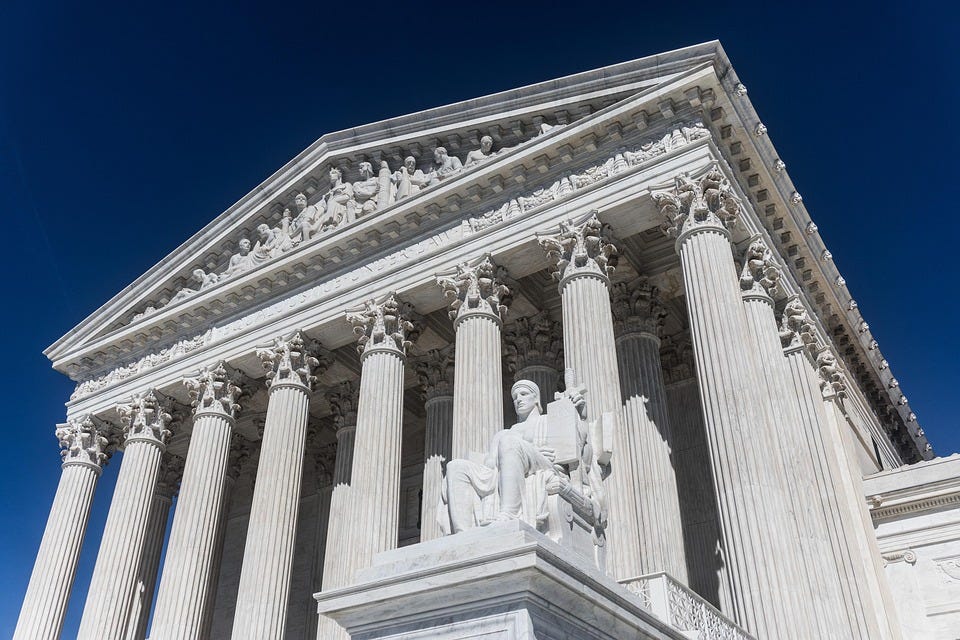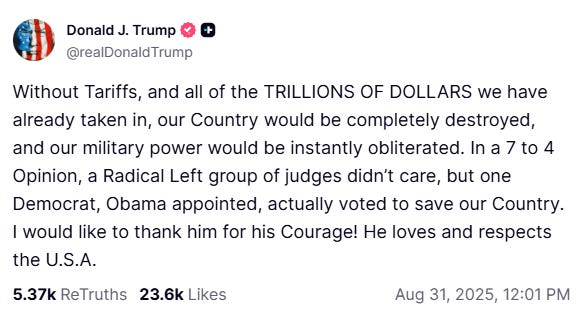Why Trump's Tariffs are Legal
Trump Administration Appealing to Supreme Court to End Lawfare
After five brutal months of unrestricted lawfare against the Trump Administration, it looks like the Supreme Court will finally weigh-in on tariffs.
On August 29, 2025, a Federal Circuit Court of Appeal decided that President Trump’s reciprocal tariffs were illegal.
Specifically, the Court ruled that the International Emergency Economic Powers Act does not authorize the President to impose tariffs of unlimited duration, on all goods from all countries. This is because tariffs are not mentioned in the Statute, and even if they were, the tariffs are not credibly related to a national emergency.
The Trump Administration is appealing. Solicitor General D. John Sauer states unequivocally that striking the tariffs “would expose our nation to trade retaliation without effective defences” and “thrust America back to the brink of economic catastrophe.”
President Trump himself hammered this point home on Truth Social, stating that without tariffs “our Country would be completely destroyed, and our military power would be instantly obliterated”.
President Trump is right.
Not has America’s economy been completely hollowed-out due to unrestricted “free" trade with adversaries like China, but America’s national security is jeopardized by reliance on foreign supply chains—this is a national emergency, and tariffs are the solution.
Can the President Impose Tariffs?
Article 1, Section 8, Clause 1 of the Constitution explicitly grants Congress the power to “lay and collect Taxes, Duties, Imposts and Excises” and to “regulate Commerce with foreign Nations”. Strictly speaking, Congress has these powers—not the Executive.
However, Congress also has the authority to delegate powers to the Executive for specific purposes. This is typically done because everyone knows—even corrupt congressmen—that the Executive is both far more responsive and nimble than Congress, and carries out the duties on the ground. Accordingly, the Executive is often better suited to exercise certain congressional powers.
In that vein, Congress has delegated—authorized—the Executive significant powers over tariffs.
What Constitutes a National Emergency?
The current case deals with the International Emergency Economic Powers Act of 1977, This Act gives the President broad powers over commerce in cases of national emergency.
This is why President Trump declared fentanyl smuggling to be a national emergency before imposing the first round of tariffs under this authority. He has also stated that America’s reliance on foreign supply chains—particularly for military equipment—is a national security risk.
The legal questions swirling around this authority include whether fentanyl smuggling, or reliance on foreign supply chains, constitutes a national emergency. If so, whether broad-reaching “reciprocal” tariffs are a relevant and proportional remedy to the issue.
The American people seem to think so—this is why they elected President Trump in the first place.
Consider that over 50,000 Americans die every year from opioid overdoses—and a further 25,000 from other drugs smuggled over the borders—it seems to me that this indeed constitutes a national emergency. Consider that Hurricane Katrina—unequivocally a national emergency—killed 1,392 people.
In terms of the remedy, I don’t see how you could possibly attempt to solve this problem without tariffs—in particular by eradicating the de minimis exemption through which these drugs are smuggled.
The reality is that an estimated $1.4 billion worth of goods came in through the de minimis exemption in 2024—this includes a significant portion of the fentanyl. Why? Because these goods came in under the radar.
President Trump was right and justified in addressing the fentanyl crisis, and tariffs and eliminating the de minimis exemption are reasonable steps to take to address the crisis.
In any case, offshoring critical elements of America’s supply chain to rivals is insane and suicidal.
Consider that America imported $763 billion worth of advanced technology products in 2024, including a sizeable deficit in silicon computer chips. The modern world runs on computers. They are in everything from our most advanced aircraft to humble toasters.
America would shut down without computers—without imports.
Not only does America rely on foreign chips, America does not manufacture the photolithography machines required to print the chips. Those come from the Netherlands, are shipped to Taiwan, who sells the finished product to the U.S. The whole supply chain is offshored, leaving America profoundly vulnerable.
This is equivalent to America buying fighter jets from the USSR during the Cold War—anyone suggesting this would have been accused of being a Manchurian Candidate.
And yet, this is exactly what everyone from lefists, to libertarians, to milquetoast “conservatives” recommend for America.
The Perfect, Imperfect Solution
In a perfect world, Congress would take action and protect American industry from unfair foreign competition. But that’s not going to happen. Why? Congress is bought and sold by Wall Street, the CCP, and a litany of other special interest groups who profit handsomely on America’s industrial decline.
The ray of hope is that Congress has delegated significant authority to the Executive to impose tariffs and otherwise regulate foreign commerce.
President Trump was elected to fix these problems. It’s time the Courts respect the Will of the People and let President Trump govern.
I’m glad to be back & publishing content regularly. Read more about I was censored during Covid-19 for speaking the truth, and why I moved the National Economics Editorial here.





